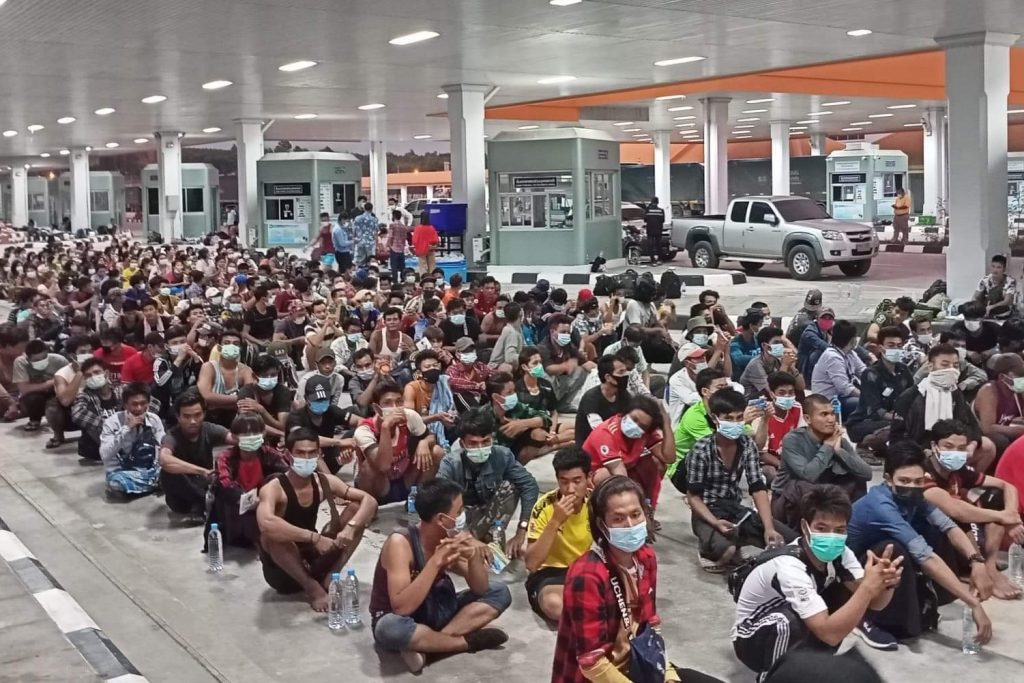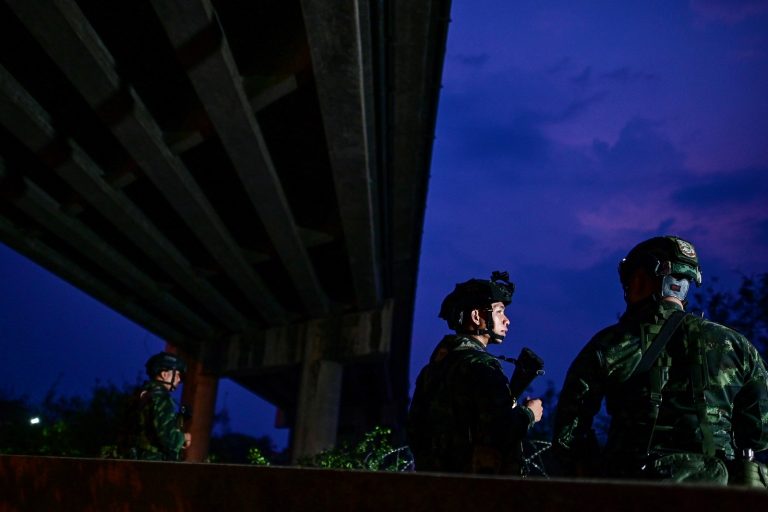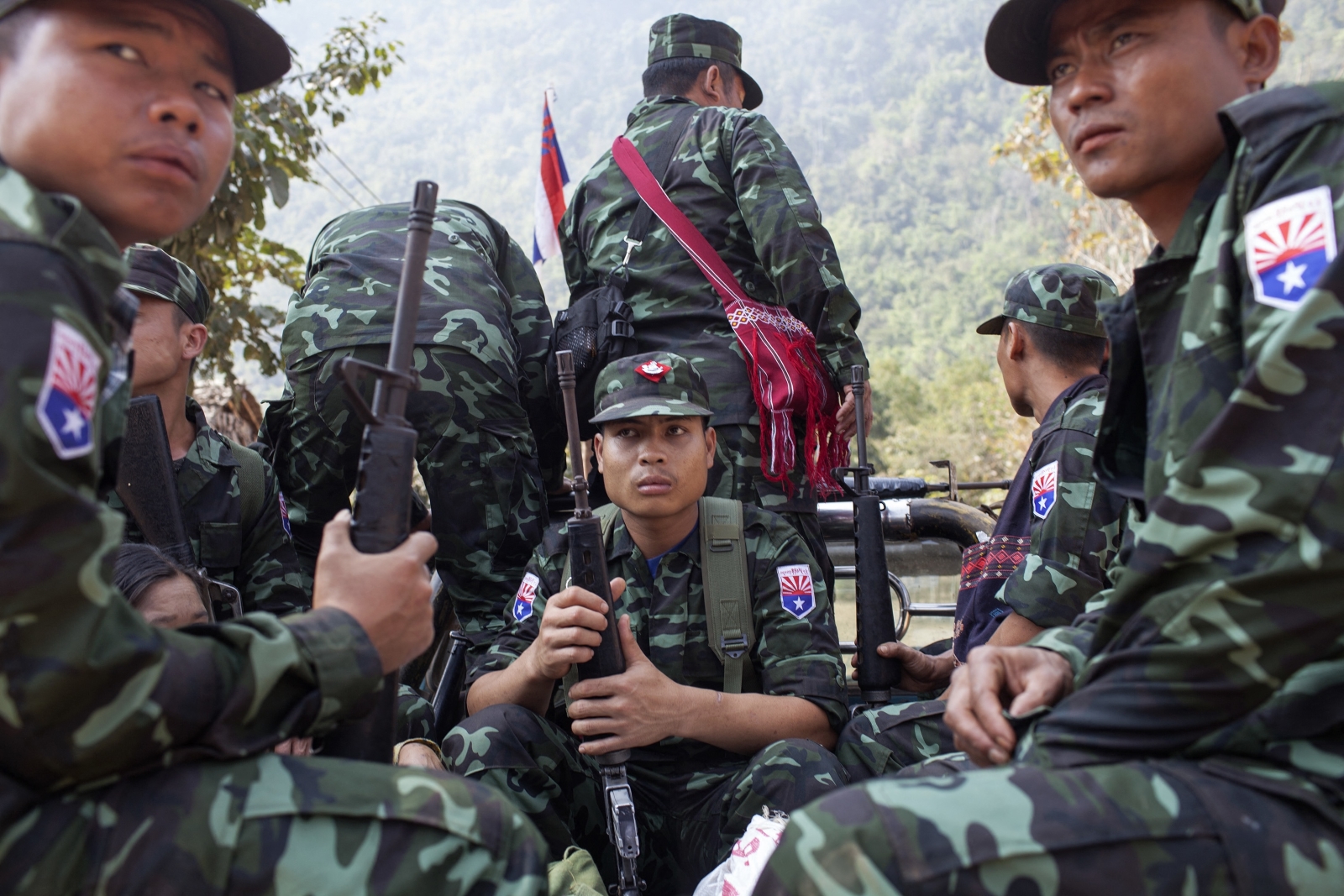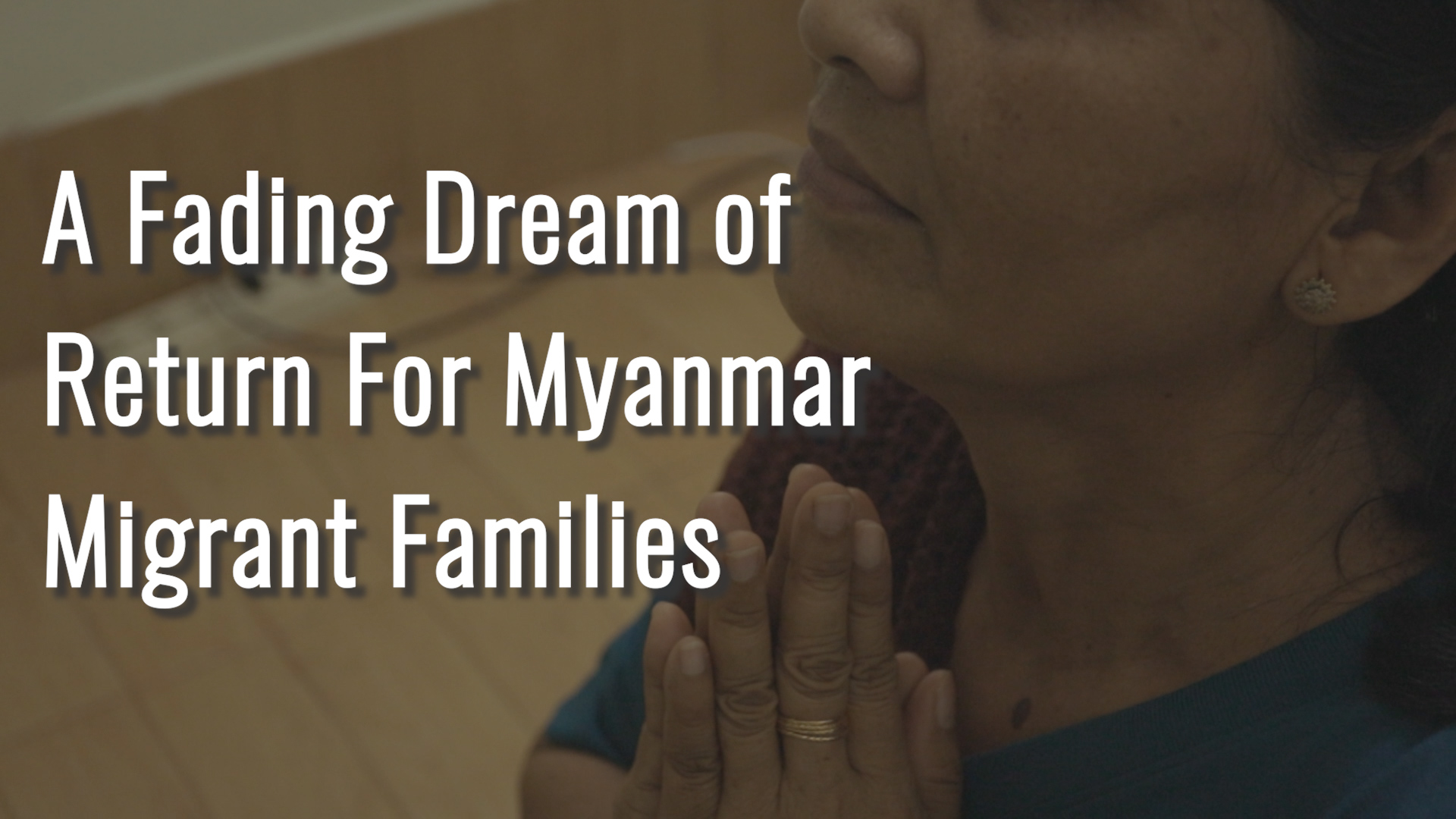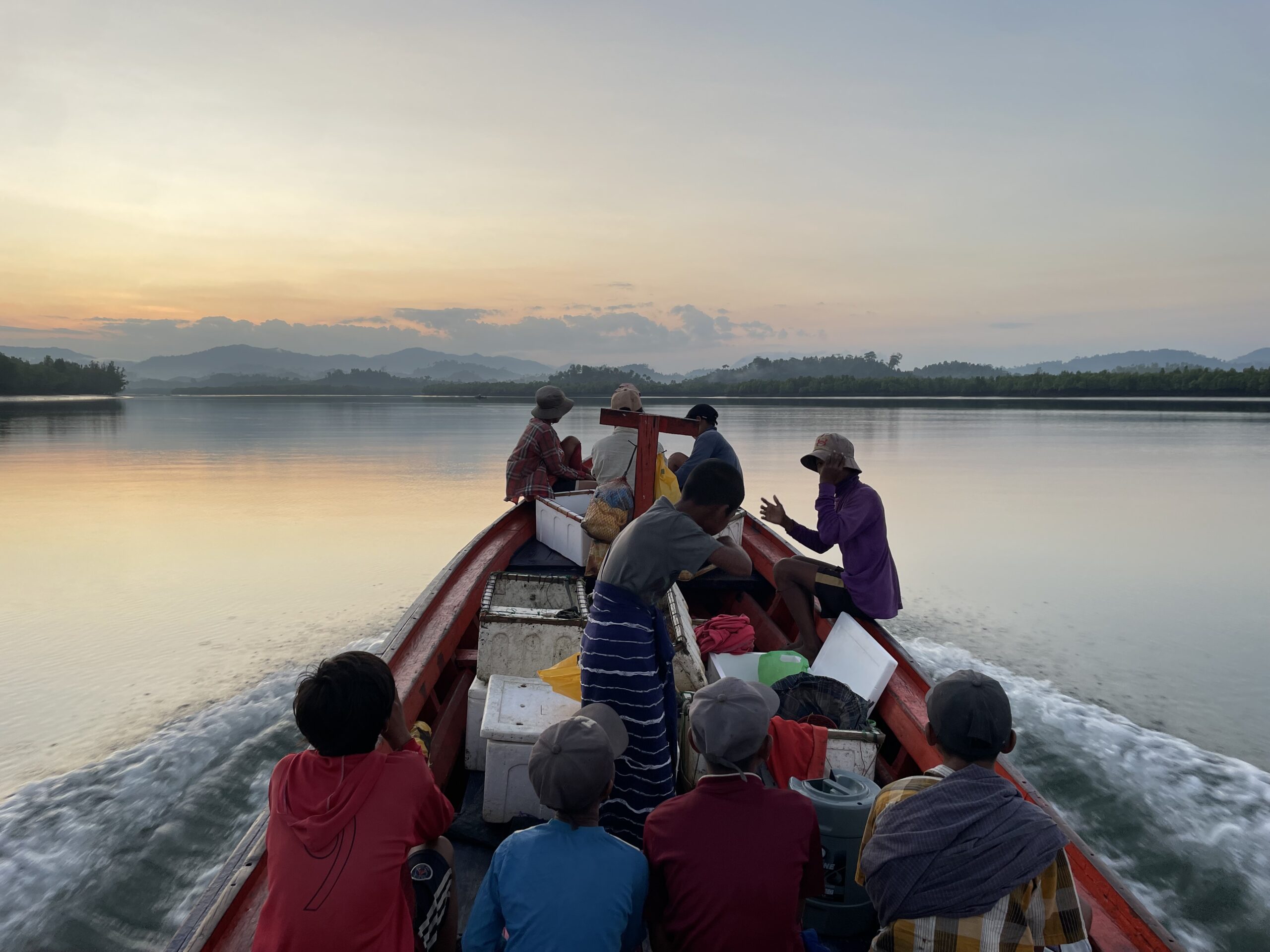The military regime’s snap closure of the border with Thailand reflects its poor handling of the COVID-19 response, migrant rights groups say, but the Thai government and employers are also making life difficult for workers.
By FRONTIER
In late May, Ko Zaw Moe left his job at the seafood processing centre of Samut Sakhon near Bangkok. He planned to return to his home in Daik-U, Bago Region, and reunite with his wife and eight-year-old son, whom he’d been worrying about constantly since the February 1 coup unleashed a wave of political unrest and violence.
“Police and soldiers have been patrolling my town and nearby towns every day because of movements by the People’s Defence Force, and I was worried about my wife and son being alone,” said Zaw Moe, 33, who asked that his real name not be used. “I wanted to get home as fast as I could.”
Zaw Moe’s hopes of a fast return have evaporated because Myanmar’s military regime closed the border at Myawaddy on June 1, stranding him and more than 400 returnees from Thailand.
The decision to close the border was announced on May 31 as a precaution against the spread of COVID-19, with the regime saying it needed more time to prepare quarantine and hospital facilities. For more than two weeks, Zaw Moe had little choice but to live under the roof of the border gate, exposed to the wind and rain.
“They should have given more than one day’s advance notice,” Zaw Moe said. “We want the government to reopen the gate as soon as possible. It’s the rainy season so we’re being tormented by mosquitoes every night. We don’t even have blankets. There are two infants here and a lot of children.”
On June 15 the border suddenly reopened, with the junta allowing 200 people to enter Myanmar every second day. With more than 600 people waiting to return, it’s likely to take a week for the backlog to clear – assuming no more migrants arrive at the border in the meantime.
The Migrant Workers Rights Network, which provides legal protection to Myanmar migrant workers and educates them about labour rights in Thailand, said those stranded on the Thai side of the border in Mae Sot included about 160 undocumented workers and 470 people who were being sent home after serving jail terms.
Ko Naung Naung, a Mae Sot-based member of MWRN, told Frontier that undocumented workers like Zaw Moe had been forced to endure terrible conditions.
“It rains almost every day in Mae Sot. The returnees are under a roof but there are no walls. Some don’t have extra clothing because they already sent their belongings to Myanmar. Volunteer groups in Mae Sot are providing them with meals, medicine and other necessities, such as [menstrual] pads for the women,” Naung Naung said.
Failing COVID-19 response
Groups based on the border say the snap closure reflects the junta’s weak response to the threat of COVID-19 – a response that has been undermined by deep anger at the coup and opposition to its rule.
When the military seized power on February 1, the border at Myawaddy was immediately closed to returnees. It reopened on March 23, with returnees were permitted to cross into Myanmar twice per day. Quoting a local border official, the Karen Information Center news agency reported that more than 180,000 people had returned home during this period.
On May 5, as the COVID-19 situation in Thailand continued to deteriorate, the number of returnees was limited to 200 people every second day. The order to close the border on June 1 came after increasing numbers of returnees tested positive for COVID-19.
KIC reported on May 14 that 65 returnees at Myawaddy tested positive for COVID-19 between the third week of April and May 12.
But getting accurate information has been difficult. U Aung Myat, a founder of the Myawaddy-based Migrant Monitoring Group, which educates migrants on Thai labour laws and provides other support, said local officials are much less transparent than they were under the National League for Democracy. They are not even releasing basic information, he said, such as the number of confirmed cases in the Myawaddy area.
“Under the previous government, U Tay Zar Aung, the former township head, informed the public each day about the COVID-19 situation, but the only news we get now is from media outlets,” he said.
Ko Than Zaw Hteik, an executive member of the MWRN, was also critical of the military-led State Administration Council for closing the border to citizens, saying it had never happened under the NLD government.
“Even when there were hundreds of thousands of returnees in the second wave, Daw Suu’s government never shut the border gate,” he said, referring to State Counsellor Daw Aung San Suu Kyi. “The returnees were welcomed systematically; they had to queue at the border for one or two days because there was so many of them, but no one has been stranded for such a long time as they have been since June 1.”
Given the lack of data, it’s unclear whether the border shutdown was even justified.
A volunteer group that was actively involved in helping returnees during the second COVID-19 wave in Myanmar said there are four quarantine centres in Myawaddy with a capacity to hold around 1,300 people.
A leader of the group, who declined to give his name, told Frontier on June 10 that the centres were not at capacity, so he could not understand why the SAC said it closed the border because it needed time to prepare quarantine centres and health facilities.
“Some of the centres may have many people under quarantine, but they still have a lot of vacant beds. Maybe it’s believed they will be needed for the third wave. Whatever the reason, the government should not be making its citizens wait at the border gate,” he said.
Returnees now also have to pay for COVID-19 tests and their stay in quarantine, the cost of which had been covered by the NLD government thanks to the support of donors and volunteer groups.
U Aung Myat, 59, of the Migrant Monitoring Group, said returnees have to pay 300 baht (about K16,000) for a COVID-19 test at the border, and K150,000 for a 10-day stay under quarantine.
“The NLD government even arranged for returnees to travel to their home areas free of charge. The travel cost was supported by a lot of donors, and the system worked well. Now, it’s all gone. In the quarantine centres, patients have to pay for everything. It increases the burden on returnees,” he said.
A member of a group of volunteers that had been involved in COVID-19 prevention said many people had withdrawn from charity groups after the coup.
“They do not want to work for or with the coup government. After medical personnel joined the civil disobedience movement, everything stopped. Even if you have volunteers and donors, you can’t do anything without doctors. But in this situation, even the donors have dried up,” he said.
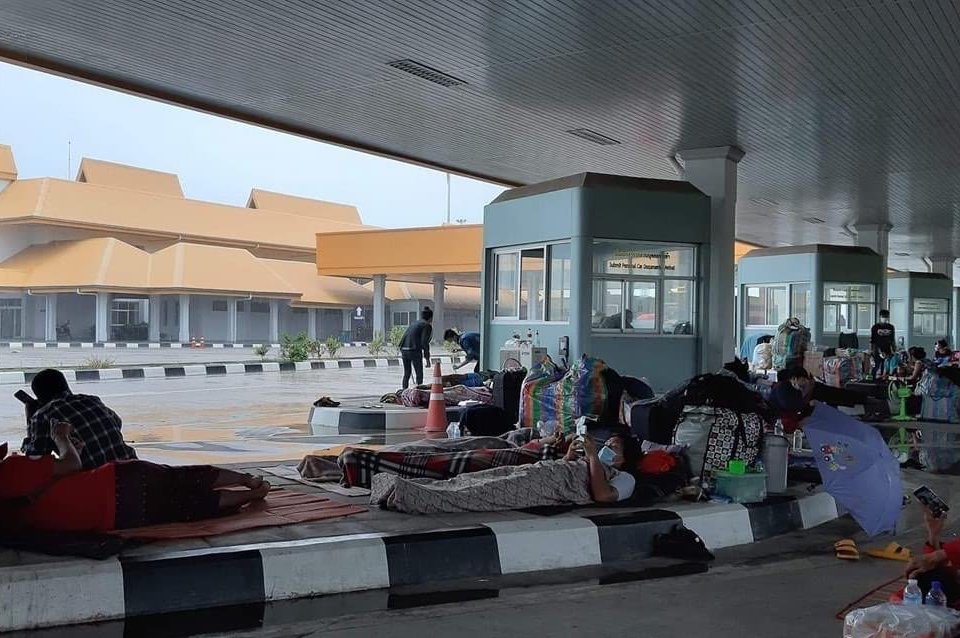
Stuck in Thailand
Zaw Moe’s return home had already been complicated by the fact he was working legally in Thailand.
Hundreds of thousands of Myanmar migrant workers left Thailand after the second wave of COVID-19 started in September 2020. But as it grapples with a third wave of the virus, the Thai government has put in place lockdowns that make it impossible for registered migrant workers to leave the country, because they are not allowed to cross provincial borders.
More than 170,000 people have been infected with the virus in Thailand since April 1, when the kingdom had recorded just 29,000 cases since the start of the pandemic.
There is a loophole, however. Those who want to return to their home countries can pretend that they have been working in Thailand illegally. After declaring themselves as illegal immigrants in the province where they are working, they are allowed to make their own way to the border to return home.
The process is organised through brokers, who arrange both the paperwork with immigration officials and the transport to the border.
“Because I told the Thai immigration department that I was working illegally, I was able to return home right away. However, it costs between 1,800 baht and 3,500 baht (K95,000 to K185,000) a person,” Zaw Moe said.
MWRN’s Than Zaw Hteik, who lives in Samut Sakhon, stressed that it costs migrants a lot of money to leave Thailand.
“They have to find agents who will inform Thai immigration that they are illegal workers, which costs about 3,000 baht. It usually costs 1,000 baht to travel to the border, so now they have usually spent about 4,000 baht by the time they reach Mae Sot,” he said.
Than Zaw Hteik said he believes the Thai government is trying to prevent migrant workers from leaving for economic reasons.
“In the second wave in Thailand, factories were closed after COVID-19 was detected among migrant workers and many had to return to Myanmar. But this time the Thai government is not allowing migrant workers to return home and it might be because there is a labour shortage in the country,” he said.
Conditions for workers are deteriorating, however, leaving some desperate to return home.
During the second wave in Thailand the government provided quarantine facilities, but now factories are having to arrange quarantine centres for workers who test positive.
Than Zaw Hteik said this change was “inconvenient” for workers because, unlike the government facilities, many employers were not providing proper food or living conditions.
Some factory owners in Thailand also do not want to pay workers for the time they spend in quarantine, in breach of the country’s labour laws. In such circumstances, the MWRN provides legal aid to workers whose labour rights have been abused.
Since the February 1 coup, Myanmar citizens living in Thailand have also had difficulty contacting the embassy in Bangkok, whose services they need to extend their passports and receive documents that prove they have the right to be in Thailand.
Although services are gradually resuming, many workers are unaware because the embassy is no longer posting updates on its website or Facebook page.
“The coup and the pandemic have created a lot of stress for workers who need to arrange paperwork with the embassy,” Than Zaw Hteik said. “Most have expired passports, but there is no news from the embassy about what to do. Many workers do not know if the embassy is open or not.”
Than Zaw Hteik said Myanmar’s military regime needs to ensure workers could return home easily and at no cost.
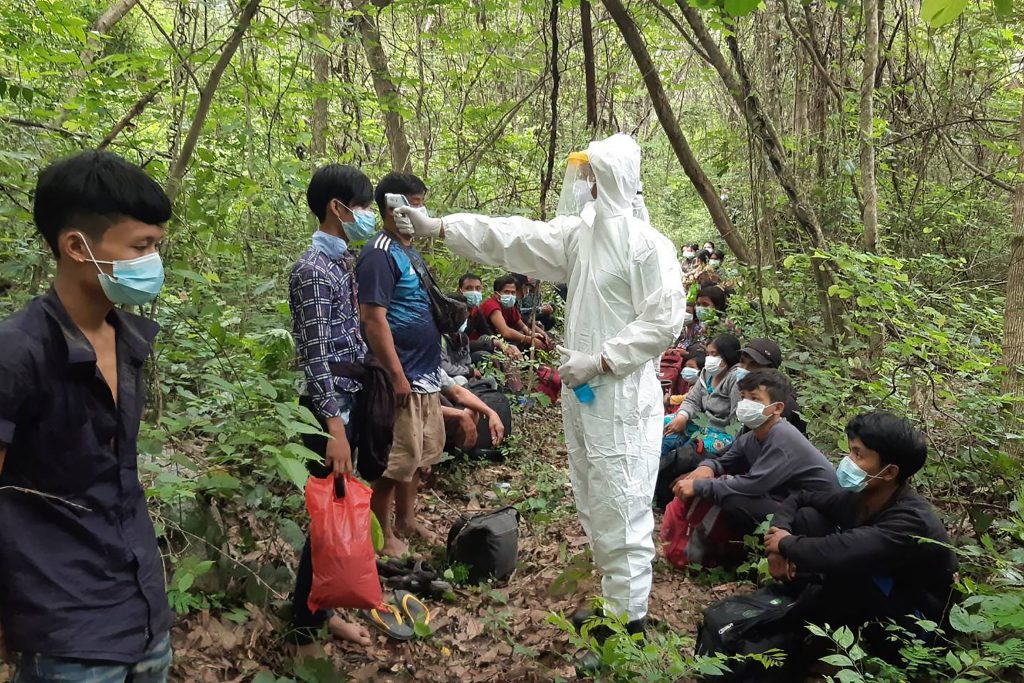
The risk of illegal entry
While some migrants are seeking to leave Thailand, others want to enter the kingdom to avoid a life of poverty in Myanmar’s shrinking post-coup economy.
However, with Thailand having closed its borders because of COVID-19, the only way to do so is by entering illegally. This usually requires large payments to brokers and carries the risk of arrest; so far, dozens of people have been caught by Thai police and soldiers while crossing the porous border, or shortly after entering the country.
Than Zaw Hteik urged his compatriots not to enter Thailand illegally, saying Thai police were regularly reporting arrests along the border.
“I understand that there are no jobs in Myanmar, but I don’t want people to try to enter Thailand illegally. It is very risky because they have to pay between 15,000 baht to 20,000 baht (K800,000 to K1.06 million) to job brokers. They are also putting their lives at risk,” he said.
Aung Myat from the Migrant Monitoring Group also urged job seekers not to believe the brokers, who were only interested in securing a fee.
“The brokers only care about the money, but if the migrants are caught in Thailand they will be arrested under the immigration and COVID-19 prevention laws. It is not worth taking the risk,” he said.
The lure of a job in Thailand is strong because the minimum daily wage is about 330 baht (about K525,000) a month. The minimum wage in Myanmar is K4,800 a day, but turmoil since the coup has meant that jobs are scarce.
“The people face a very tough future because the country is suffering a lot politically and economically. The pandemic will continue and we need to prepare,” Aung Myat said. “We are going to need to save money and get back into the habit of living a more self-sufficient life, such as by growing our own vegetables.”


